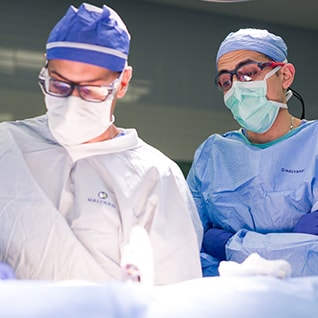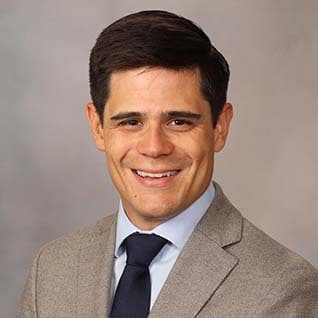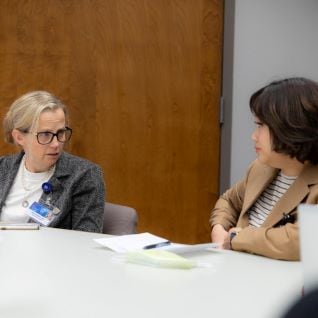/prod01/channel_2/media/mccms/content-assets/academics/residencies-and-fellowships/abdominal-transplant-surgery-fellowship-mn/department-and-faculty/Cortez-Alex-512X512-WF30351156_20240916.jpg)
Alex Cortez, M.D
/prod01/channel_2/media/mccms/content-assets/academics/residencies-and-fellowships/abdominal-transplant-surgery-fellowship-mn/3983119_0042-faculty-1024X512.jpg)
Compassionate care for patients and families, as well as experienced medical and allied health teams, are hallmarks of Mayo Clinic's transplantation services. Mayo Clinic's campus in Rochester, Minnesota, offers heart, kidney, liver, lung, and pancreas transplants. Bone marrow transplants (BMTs, or blood and marrow transplants) are offered through the Division of Hematology.
Abdominal transplant procedures are performed at Mayo Clinic Hospital, Methodist Campus, in operating rooms that are specially set up for these complex operations. After each transplant, patients are cared for by staff members experienced in the needs of patients recovering from transplant surgery.
Mayo Clinic sees outpatients with transplant surgical issues from across the U.S. and around the world, as well as from the large local population. See transplant patient stories.
 Besides caring for patients in their clinical practices, Mayo Clinic's faculty members are committed to teaching and facilitating the growth of medical knowledge. Many of our faculty have published and lectured extensively and are recognized leaders in their fields. You have direct access to these individuals throughout the fellowship.
Besides caring for patients in their clinical practices, Mayo Clinic's faculty members are committed to teaching and facilitating the growth of medical knowledge. Many of our faculty have published and lectured extensively and are recognized leaders in their fields. You have direct access to these individuals throughout the fellowship.
During the Abdominal Transplant Surgery Fellowship, you also have access to these resources and support services:
 Thank you for considering Mayo Clinic for your abdominal transplant training. The two years you will spend with us are challenging but deeply rewarding — a time of tremendous growth, impact, and professional fulfillment. As transplant surgeons, we have the privilege of caring for patients at their most vulnerable moments, and with that comes a great responsibility.
Thank you for considering Mayo Clinic for your abdominal transplant training. The two years you will spend with us are challenging but deeply rewarding — a time of tremendous growth, impact, and professional fulfillment. As transplant surgeons, we have the privilege of caring for patients at their most vulnerable moments, and with that comes a great responsibility.
At Mayo Clinic, we are committed to excellence in both surgical training and compassionate patient care. Our faculty and staff are deeply dedicated to their work and to creating a collaborative, supportive environment where fellows can thrive both professionally and personally. We place great emphasis not only on rigorous education but also on fellow well-being and maintaining a healthy work-life balance.
With our volume, complexity and diversity of transplant cases, you will acquire the expertise and confidence necessary to excel in the field of transplant surgery. It is our hope that your time here will be a period of intensive learning that you will look back on with great satisfaction — perhaps even fondness. We are honored to welcome you to our program and look forward to supporting you throughout your fellowship.
Alex Cortez, M.D.
Program director, Abdominal Transplant Surgery Fellowship
Regularly engaging in meetings with the program director and establishing clear goals and expectations from the outset of my fellowship have played a pivotal role in shaping my training and will significantly contribute to achieving my ultimate aspiration of securing a position as a multi-organ abdominal transplant surgeon.
Jenny Lam, M.D.
Abdominal transplant surgery fellow (2022-2024)

Transplant Center faculty members generally have an open-door policy. Daily interaction between staff and fellows is encouraged. Upon graduation, most fellows can name several staff members who strongly influenced their development and career choice.
Many prominent professors visit Mayo Clinic each year and present their work during lectures and participate in hospital rounds. You are encouraged to take full advantage of these opportunities.
I greatly enjoyed the mentorship model of training. From day one of the fellowship, I took an active role in the operating room and on the hospital floor. I developed graded operative independence under the guidance of dedicated surgeons; by the conclusion of my fellowship, I was training junior fellows and general surgery residents in kidney transplantation and deceased donor procurements and was independent in the conduct of liver transplant and living donor nephrectomy.
Shennen Mao, M.D.
Abdominal transplant surgery fellowship alum, class of 2019